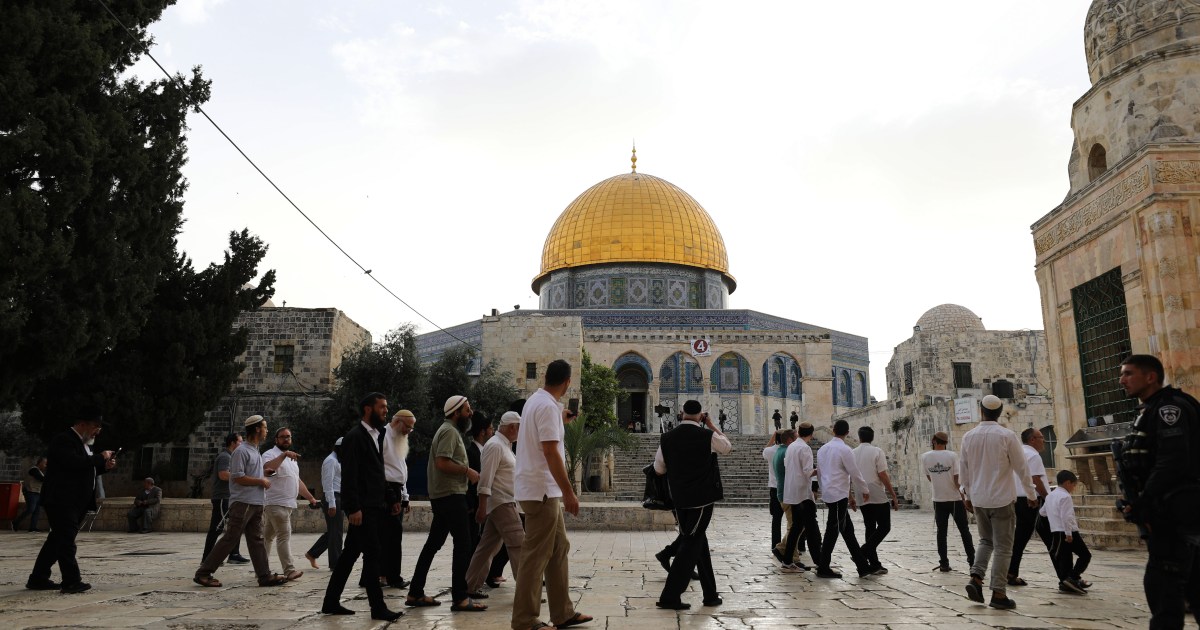Today, Sunday, the Israeli Magistrate's Court issued a preliminary ruling allowing settlers to perform their Talmudic prayers loudly and perform something similar to kneeling during their storming of the courtyards of Al-Aqsa Mosque. The Palestinian presidency and the Jordanian Foreign Ministry condemned the decision, and the Palestinian Foreign Ministry described it as a declaration of religious war.
And Anadolu Agency reported that the Israeli court's decision says that settlers' prayer loudly and bending over the ground inside Al-Aqsa Mosque "is something that cannot be criminalized or considered as violating civil peace."
The decision of the Israeli Magistrate's Court was issued based on an appeal filed by lawyers against the arrest of 3 settlers who performed loud prayers and bowed on the ground during their storming of Al-Aqsa Mosque last week, contrary to the instructions of the Israeli police.
The Three Settlers
The Israeli court considered that what the three settlers did during their storming of the Al-Aqsa Mosque did not indicate any behavior on their part that might lead to disorder or disruption of order. The judicial decision stated that “all residents of Israel are allowed to go up to the Temple Mount and practice their religious rites.”
In October 2021, the same court decided to allow Jews to pray silently in the courtyards of Al-Aqsa Mosque.
The decision of the Zionist court to allow the performance of Talmudic prayers in Al-Aqsa is a preparation for the implementation of the time and spatial sharing scheme in the mosque.
The decision torpedoes the agreement of King Netanyahu of Jordan in 2015, in which Israel committed itself to preventing the performance of these prayers, and on the basis of this agreement, the king returned the ambassador to Tel Aviv at the time.
(1-2)
— Dr. Saleh Al-Naami (@salehelnaami) May 22, 2022
Israeli Interior Minister Ayelet Shaked and Inspector General of Police Kobi Shabtai said last month that Jewish visitors perform their religious rites, and lie down in the courtyards of Al-Aqsa Mosque is not forbidden.
vow of religious war
In response to the Israeli judiciary’s decision, the Palestinian Foreign Ministry said that the Israeli court’s permission for Jewish extremists who storm Al-Aqsa Mosque to perform Talmudic rituals and prayers, including reciting hymns and prostrating on the ground, is an explicit declaration of religious war that threatens to explode the conflict arena and the entire region.
The ministry added that this decision represents an official Israeli coup against the status quo in Al-Aqsa Mosque and completely changed it, and stressed that the decision is "new evidence that the judicial and court system in Israel is an integral part of the occupation system itself" and further evidence of providing legal protection and coverage for the incursions of Jewish extremists. Al-Aqsa Mosque, with the aim of consolidating its temporal division until it is divided spatially.
The Palestinian presidency warned of the decision of the occupation court to allow settlers to perform Talmudic rituals in Al-Aqsa, describing the matter as a "serious violation of the historical status quo at the Temple Mount."
Prelude to the division of the campus
The Court of the Palestinian Chief Justice said that any attempt by the Israeli occupation to change the historical situation in Al-Aqsa will lead to a religious war, and warned that "allowing the settlers to perform their Talmudic rituals inside Al-Aqsa is a prelude to the temporal and spatial division scheme."
For its part, the Islamic Resistance Movement (Hamas) considered that the Israeli judiciary's decision "crossed all red lines and a dangerous escalation," stressing that "Al-Aqsa Mosque is a pure right of Muslims, and the occupation and its extremist groups will not succeed in imposing a new reality on its land."
The Jordanian Foreign Ministry also condemned the Israeli court's decision, describing it as "void and without legal effect according to international law, which does not recognize the Israeli judicial authority over the Palestinian territories occupied in 1967, including East Jerusalem."
The Jordanian Foreign Ministry stressed that the Holy Mosque in its entirety is a place of worship purely for Muslims, and that the Department of Endowments for Jerusalem and the Affairs of the Blessed Al-Aqsa Mosque in Jordan is the legal body and has the exclusive jurisdiction to manage all the affairs of the campus, and to regulate entry to it.
The position of the Bennett government
On the other hand, the Israeli Channel Seven said that the government of Prime Minister Naftali Bennett will appeal the Magistrate's Court's decision to allow Jews to perform Talmudic prayers at Al-Aqsa Mosque.
The Minister of Regional Cooperation, Issawi Freij, said that the court's decision violated the current situation in Al-Aqsa Mosque, describing it as "irresponsible and dangerous," adding that he requested a postponement of the implementation of the decision "to stop setting fires in the area."
The Israeli government stated today, after the court's decision, that it has no intention of changing the status quo at Al-Aqsa Mosque.

